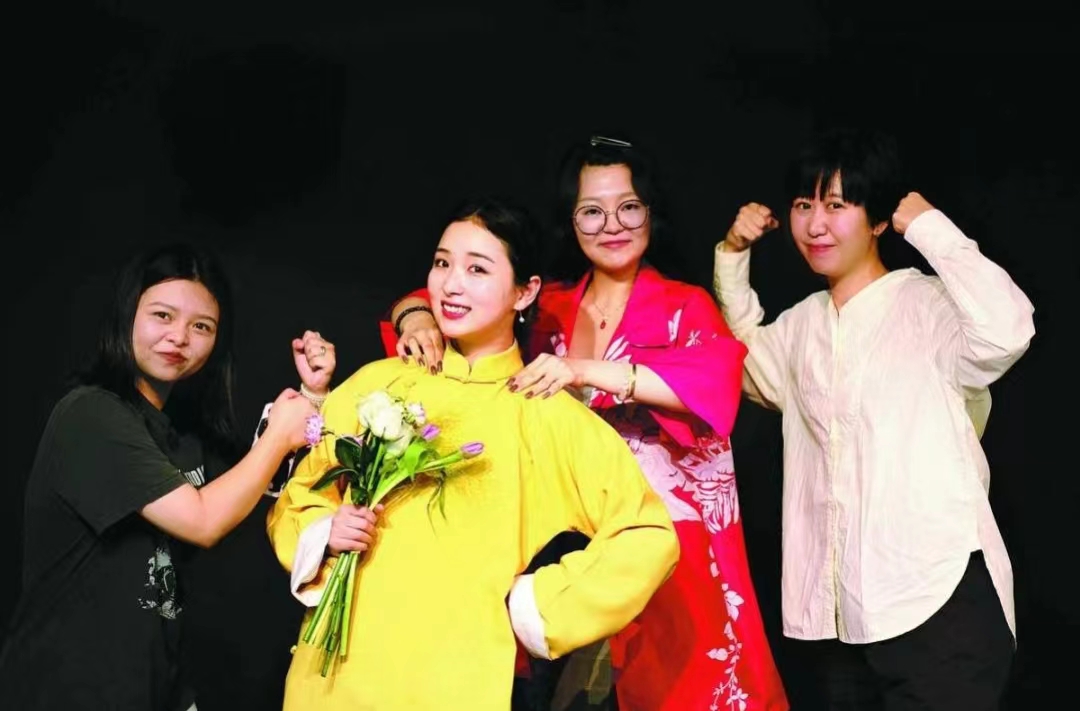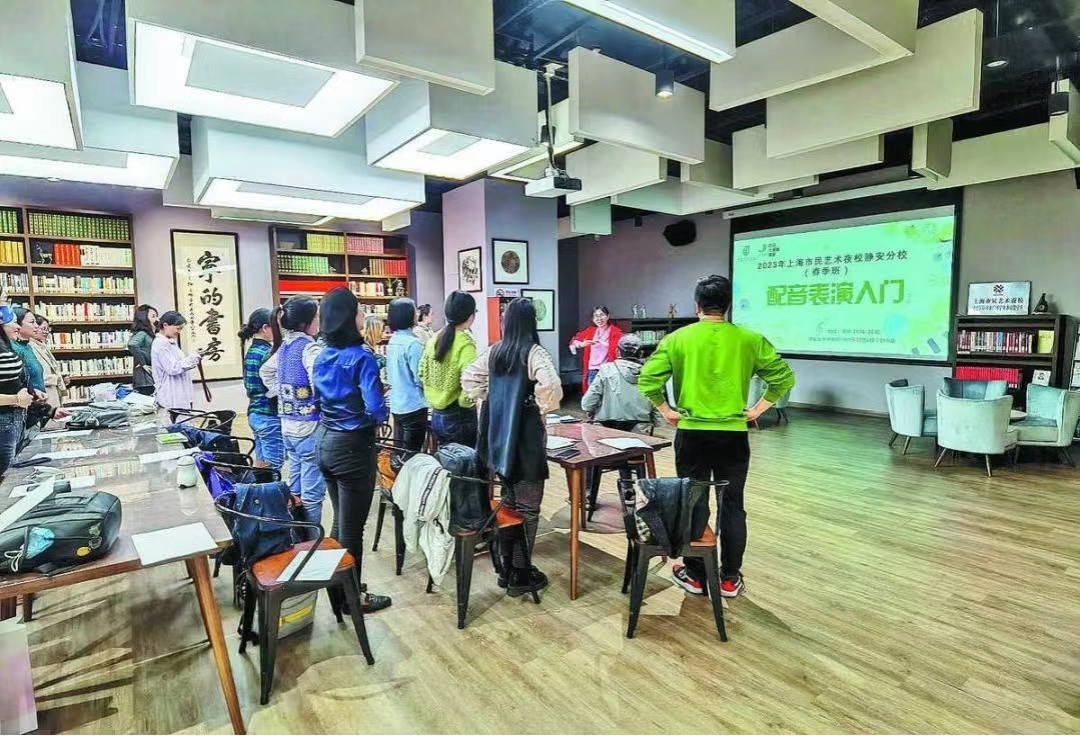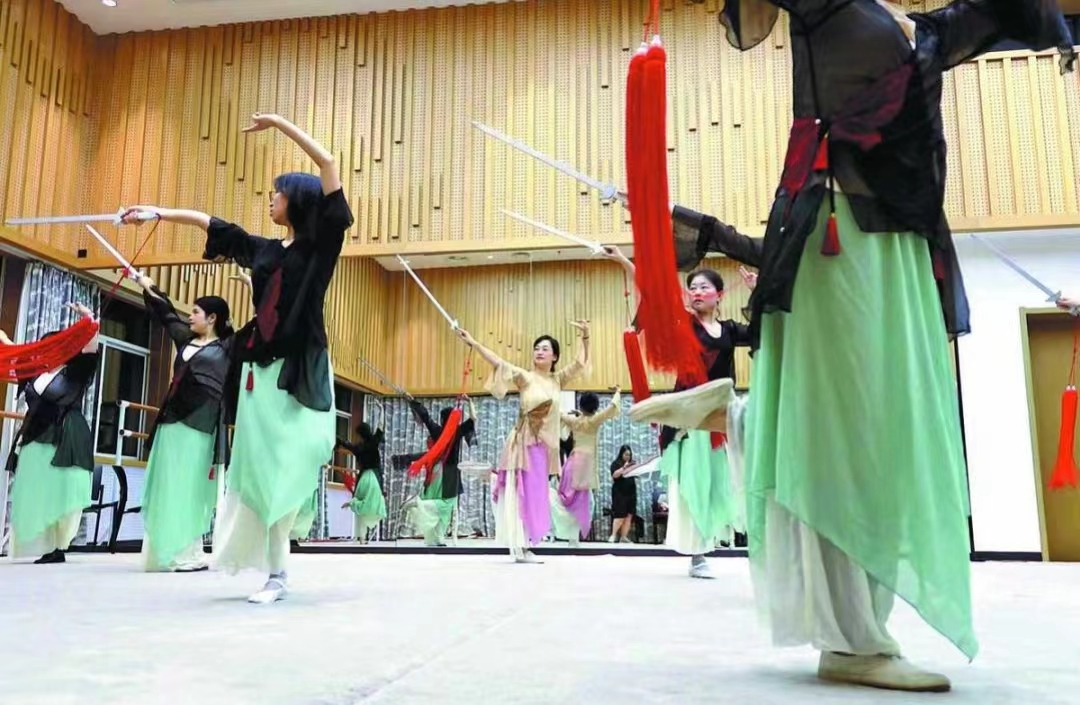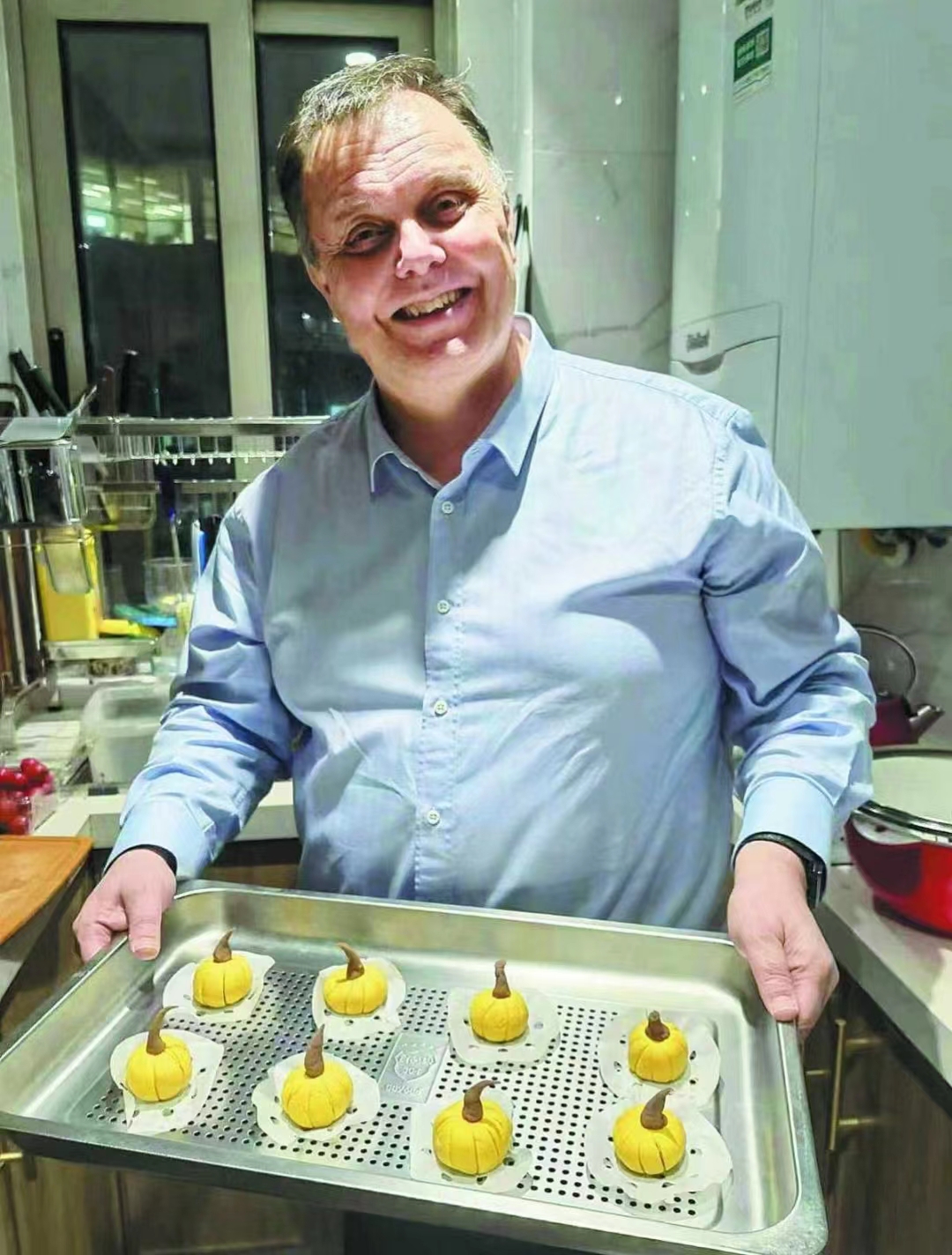
今日上海
上海的夜间艺术学习遥遥领先全国 - 2023年08月30日
Shanghai leads way with nocturnal art studies

Liu Xuelian, second from the left, nicknamed Mango, joins friends during her cross-talk show in Shanghai late last month.
Courses in city attract thousands of applicants
Liu Xuelian, nicknamed Mango, a 27-year-old test engineer in Shanghai, made her cross-talk debut on stage at the Shanghai Mass Art Center on July 20.
This was no career change. She was taking part in an end-of-class performance after a three-month art course held in the evenings during spring.
Cross-talk was one of the 278 evening art courses available for the public this spring. The night art course program was launched in 2016 by the Shanghai Municipal Administration of Culture and Tourism.
The program focuses mainly on providing culture and art courses to those in the 18 to 55 age bracket who usually work during the day. Participants take 12 lessons given by professional tutors for a cost of about 500 yuan ($70), far below the market price.
Based at the Shanghai Mass Art Center, the program covers all the city's 16 districts. There are more than 100 teaching locations, each with a different syllabus, to cater to demand. The program's courses range from traditional culture, fashion and intangible cultural techniques, to music, dance, coffee, food, makeup and lifestyle lessons.
In April, when the program started registration for the spring semester, thousands of applicants arrived.
Wu Penghong, curator at the Shanghai Mass Art Center, said: "When registration started at 10 am on March 6, more than 380,000 people tried to sign up for courses given at 123 teaching locations, with 6,507 successfully securing places. The sword dance course was the most popular, selling out in just eight seconds."
The fall semester for Shanghai's evening art courses starts next month, with 143 teaching locations across the city and a total of 390 online and offline courses on offer.
Online registration for the new semester began at 10 am on Aug 11, attracting applications from more than 654,800 people, far more than the number for the spring semester.
Within a minute of registration starting, 12 courses sold out, including those for handmade leather goods, baking, Shanghai dialect, jazz dance, singing, tai chi, cosmetics and yoga. Classes at 13 locations were filled in less than half an hour.
Registration data for the spring semester show that evening art courses are especially popular among younger people. Those born in the 1980s accounted for 39 percent of the places taken, while applicants born in the 1990s took 40 percent.

Wanda Reign on the Bund, located in the heart of Shanghai, will be the first hotel in the city to host evening art courses for the autumn semester.
Relieving pressure
Mango, who used to play drums in a punk band at college, was among the successful applicants in the spring, but she did not originally plan to take the crosstalk course.
"I first tried to sign up for music or drawing classes, but they were all sold out," she said.
She works in management at a State-owned company. Although her job is not too demanding, she struggles to form interpersonal relationships, adding to her pressure outside work. As she enjoys a diverse range of activities in her spare time, she wants to try something fresh and meet new people.
The cross-talk course requires a great deal of communication, interaction and connection.
Chinese cross-talk, or xiangsheng, is a traditional comedic style that relies heavily on language and wordplay. It is usually performed in dialogue between two performers or as a monologue, with the aim of entertaining the audience.
A typical evening art course is attended by about 25 people. Running for three months, a single course includes 12 lessons, each lasting 90 minutes.
Mango said she enjoyed the course. "My classmates came from various walks of life. They included programmers — who often had to work overtime — from Chinese tech giant ByteDance, and many university students who are cross-talk enthusiasts.
"We prepared a five-minute performance in groups at the end of the course. What impressed me most was that when we finished the rehearsal for the final show, everyone in the class suddenly became comfortable with each other, and we greeted one another as if we were longtime friends."
Before the final show, Mango sent a promotional poster she crafted as an invitation to her friends, several of whom showed up to witness her cross-talk debut.
"I had the largest number of friends attend my graduation show that night, and we had a great time. In particular, I feel much calmer now. It's as though I have regained my former self," she said.

Participants practice voice acting at an evening art course during the spring semester in Jing'an district, Shanghai.
Operatic links
The sword dance course, which sold out in only eight seconds, is related to Chinese traditional opera, and the lessons were given by Chen Rongrong, a professional artist from the Shanghai Huaiju Opera Troupe.
Huaiju Opera is popular in Shanghai and Jiangsu and Anhui provinces. Dating to the Qing Dynasty (1644-1911), it found favor in Shanghai in the 1950s. Inspired by folk ballads from regions north of the Yangtze River, Huaiju Opera's roots lie in folk culture, and it is listed as an intangible cultural heritage.
Chen, who started to learn Huaiju Opera in 1998, joined the Shanghai Huaiju Opera Troupe in 2002. Over the past 25 years, she has also learned Peking Opera and Kunqu Opera to improve her performance.
"The sword dance I taught at the night art course included not only traditional movements, but also those that I perfected during my performances," Chen said.
"Most of the participants in the class for the three-month course were aged from 30 to 45, and they share an interest in traditional Chinese opera. They were really happy to have this chance to get close to the art and learn from a professional opera troupe at an affordable price," she said.
Chen hopes the participation of professional performers can lead to more evening art course categories being introduced to better satisfy demand.
"For our performers, promoting Huaiju Opera is one of their lifetime duties. By setting up the night art courses, we are able to cultivate participants' interest in Huaiju Opera, expand our audience, develop new markets, and inject fresh blood into this ancient art form," Chen said.
She also gained much from the sword dance course.
"As a teacher, I won the participants' friendship. The atmosphere in our class is exceptionally good. Sharing a love for opera, the classmates were always united in helping and encouraging each other — even online when someone was absent for business trips," Chen said.
"Seeing their passion, I have become more enthusiastic about passing on the art of Huaiju Opera. I believe that through continuous promotion, more audiences will get to know about the art form, understand it and enjoy it. It is my lifelong mission to attract more people to the theater to listen to Huaiju Opera."

A sword dance is practiced during the evening art course with Shanghai Huaiju Opera Troupe.
Cultural exchange
Shanghai's evening art courses are also open to the large number of expatriates in the city.
For the first time, a Chinese pastry-making class was set up in the spring semester for expatriates, attracting eight participants from countries such as Brazil, Japan, Mexico, Russia and the United Kingdom.
John Wade, 59, a music teacher from the UK living in Shanghai, was one of those who enjoyed the class.
"I initially got information about the class from my wife. Although Chinese cooking seems very difficult to me, I wanted to try it," said Wade, whose wife comes from Shanghai. The couple met 18 years ago.
Born in London, Wade first arrived in China with his mother for a holiday in 2001, when he was captivated by the nation's culture. Two years later, when a teaching job became available at an international school in Shanghai, he seized his chance, and has been in China ever since.
"I also love Chinese food. When I was a kid, I used to like Cantonese-style cuisine, which we have in the UK. I used to cook a couple of dishes myself, but I became a vegetarian after I went to university," he said.
Although he has been a vegetarian for 25 years, Wade has many options to satisfy his appetite. "I love Chinese vegetarian food and the way the vegetables are cooked. There are many amazing vegetarian restaurants in Shanghai that magically make vegetables taste like meat," he said.
This may be another reason for Wade joining the pastry class, where he found that Chinese cooking can be easy and relaxing.
"I discovered from my wife that the teacher at our night art course is a top chef at some of Shanghai's most renowned hotels. He is a very good teacher, extremely patient, and he made the lessons fun," Wade said.
With the help of a volunteer translator, Wade learned to make several types of traditional Chinese pastry, including that in the shape of pumpkins and corn, as well as qingtuan — sweet green glutinous rice balls traditionally eaten during Qingming Festival in spring.
"We learned to make one or two new types of pastry during each class. It looked difficult at first, but by following the teacher step by step, we all succeeded in the end. I took the pastry home after class, and even my father liked it — and he is very hard to please when it comes to food," Wade said.
As a crucial part of Chinese culture, food usually reflects local history and life.
Wade said, "Although my classmates came from different countries and sectors, we had a pleasant time together. They helped me a lot, especially when I sometimes struggled to keep up with the teacher."
Over the past two decades, Wade has lived in several locations in China, but he likes Shanghai the best, and is now spending his 11th year in the city.
"Shanghai is more open and I feel more accepted in the city, as there are so many different cultures here," he said.
"The class was on a Monday night. It was so nice to have such an activity at the beginning of the week. There was no pressure during the class, so it was very relaxing and fun. I would love to try some new lessons in the future."

John Wade brings the Chinese pastry he made in class to share with his family.
Widely popular
In addition to art courses, the fall semester includes more practical and lifestyle lessons to better cater to demand.
For example, classes on business etiquette and making PowerPoint slides have been set up for the first time, aimed at helping young people prepare for work.
A sign language class has been launched to enable participants to communicate with people with impaired hearing, and hopefully to help build a volunteer team to serve those with such conditions. A social networking class featuring pets and bridge playing has also been added.
Tao Xin, deputy head of the training department at the Shanghai Mass Art Center said: "We hope that participants can gain a basic knowledge of subjects they are interested in through the 12-lesson courses we provide. Apart from the art courses, we are also looking to cover subjects such as fashion, lifestyle, culture and sports."
The class venues are also becoming more diverse. Evening art courses used to be held mainly in cultural centers, but in the autumn, they will also be staged in luxury hotels and museums.
Wanda Reign on the Bund, which is located in the heart of Shanghai and features spectacular views of the Bund, the Huangpu River and Pudong skyline, will become the first hotel in the city to host evening art courses. Participants will learn to play the zhongruan, a traditional stringed instrument, at the venue once a week.
An exhibition hall featuring the life and times of Soong Ching Ling, the wife of Sun Yat-sen, will extend its opening hours to cater to evening art courses. It will stage lessons in flower arrangement, basic piano playing, and dramatic performance from next month.
Wu, curator of the Shanghai Mass Art Center, is calling for more venues and market entities to join the evening art course program to offer additional public cultural services.
"We hope to build a bridge of communication through these art courses to enable more people to interact with each other, improve aesthetic literacy, and promote physical and mental health. Shanghai is home to over 20 million citizens, and our final goal is to equip them with one art skill each," Wu said.
Such art courses are not confined to Shanghai, as the nation is working continuously to meet people's intellectual and cultural needs.
Numerous cities across China have introduced similar programs in recent years, such as Chengdu in Sichuan province, Shenzhen and Guangzhou in Guangdong province, and Luoyang in Henan province.
Source: China Daily

